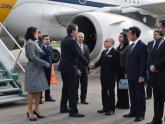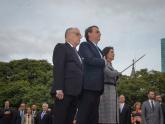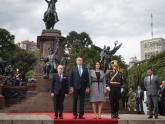On 6 June, President Mauricio Macri welcomed the President of the Federative Republic of Brazil, Jair Messias Bolsonaro, who made an official visit to Argentina during which both presidents reaffirmed the bonds of friendship and cooperation between both countries and addressed issues pertaining to the regional and international bilateral agenda.
Both Presidents and their Delegations reaffirmed their willingness to work together and their commitment to strengthening the bilateral relationship in all respects, reaching agreements and jointly facing regional and global challenges.
The Presidents,
Ratified Argentina and Brazil's political determination to strengthen and modernize MERCOSUR, focusing on its institutional reform and on trade exchanges between MERCOSUR countries, as well as on the bloc's international integration through the modernization of its tariff structure and the conclusion of ongoing negotiations of trade agreements.
Instructed their negotiation teams to intensify their efforts to conclude, along with the other two members of MERCOSUR, the ongoing negotiations with the European Union, EFTA and Canada, and to continue negotiations with Korea and Singapore.
Highlighted the work jointly undertaken by MERCOSUR and the Pacific Alliance with a view to making progress on the integration process taking place in the context of the Dialogue between both blocs.
Welcomed the establishment of what is virtually a South American free trade area for the trade of goods in 2019, the year of completion of tax elimination schedules under trade agreements between MERCOSUR and its Associate States within the context of ALADI, as well as the ongoing expansion, modernization and strengthening process which the Member Countries and their partners from ALADI are going through in the context of agreements signed by MERCOSUR.
Highlighted the meeting of Heads of State held in Santiago, on 22 March, in which the idea of a new regional forum to make progress towards the integration of South America, based on the principles of democracy and free trade, was introduced.
Reaffirmed Argentina and Brazil's interest in beginning the process to become part of the Organization for Economic Co-operation and Development (OECD) and expressed their hope that the members of the organization will soon reach the necessary political understandings for the expansion of the OECD.
Agreed on the importance of energy as the driver of economic and social development and, in that regard, highlighted the role of planning as an essential tool to adapt growth projections to necessary energy resources.
Agreed to instruct the respective responsible bodies to strengthen the exchange of technical information on energy planning.
Underscored the importance of gaining access to new energy sources to sustain development, and acknowledged the potential of oil and natural gas reserves and production in the Pre-Sal and Vaca Muerta fields. In that context, they committed to continue to promote the development of new energy resources in their respective territories.
Agreed on the importance of continuing to work on integration and joint collaboration mechanisms, with a focus on energy projects based on the particular circumstances of each country. In that context, the Technical Joint Committee for the use of shared water resources of the River Uruguay will focus on determining the timing and the mechanisms to promote the necessary studies.
Agreed on the importance of bioenergy and biofuels for energy security, economic development and protection of the environment. They expressed their satisfaction at the cooperation bonds between Brazil and Argentina in the BioFuture Platform and the MERCOSUR Ad Hoc Group for Biofuels. They agreed to strengthen their cooperation in those fields and in a new bilateral process with a view to progressively harmonizing policies and technical rules for the sector.
Instructed their Ministers to fulfil the commitments undertaken at the 8th Bilateral Committee on Production and Trade, and to determine the course of action to be taken with a view to promoting more access to their respective markets, thus reaffirming the need to focus on issues of regulatory convergence, trade facilitation and border control to facilitate the transportation of goods between both countries.
Highlighted the importance of the service sector and agreed to work together to promote and facilitate bilateral service trade, especially in the field of air and knowledge-based services.
Underscored, in the context of the 25th anniversary of the entry into force of the Quadripartite Agreement, the importance of the historical bilateral cooperation in peaceful uses of nuclear energy between both countries and the agencies involved, including the Brazilian-Argentine Agency of Nuclear Material Accounting and Control (ABACC), and highlighted the importance of continuing to strengthen political and technical dialogue in the context of existing bilateral consultation and coordination mechanisms, such as the Standing Committee on Nuclear Policy and the Binational Committee on Nuclear Energy.
Highlighted the strategic value of the relationship between both countries in the field of defence and acknowledged the importance of making progress in terms of cooperation in maritime governance in the South Atlantic, common borders, science and technology, and industry, understanding that complementarity is the way to face the challenges of the 21st century and promote the development of both countries. Agreed on the importance of increasing cooperation between the Armed Forces of both countries and expressed their satisfaction with the strategic partnership between FAdeA and Embraer with a view to manufacturing aircraft KC-390.
Underscored the existing cooperation opportunities in the space field, and reaffirmed the continuity of the SABIA-Mar satellite project.
Emphasized the upcoming incorporation of Uruguay into the Argentina-Brazil Centre for Biotechnology (CABBIO), which has trained highly qualified professionals in the field of biotechnology in Argentina, Brazil and the region for over 30 years.
Expressed their satisfaction at the cooperation possibilities that arise from the signing of the "Shared Digital Vision" Declaration.
Welcomed the progress made in public security, and ratified their mutual commitment to strengthening the fight against drug trafficking, corruption, and transnational organized crime by means of concrete actions that guarantee the safety of the citizens of both countries.
Agreed to jointly promote cooperation and the search for consensus to create regional mechanisms to fulfil commitments made by both countries under the Palermo Convention against Transnational Organized Crime.
Shared experiences on border cooperation and instructed the migratory and customs bodies of both countries to simplify and speed up border controls.
Analysed the serious political, humanitarian, economic and social crisis affecting Venezuela as a result of Nicolás Maduro's illegitimate regime. Reaffirmed their full support for the Roadmap laid out by Interim President Juan Guaidó, as well as for the actions undertaken by the Venezuelan people under his leadership.
In that regard, they reiterated their commitment to help deal with the Venezuelan crisis at a regional level, including during the 49th General Assembly of the Organization of American States (OAS), to be held in June, in Medellín, Colombia.
The President of the Argentine Republic thanked the President of the Federative Republic of Brazil for his support for the candidacy of Argentina, Chile, Paraguay and Uruguay to jointly host the FIFA World Cup in 2030.
The President of the Federative Republic of Brazil renewed his country's support for the legitimate rights of the Argentine Republic in relation to the sovereignty dispute with United Kingdom of Great Britain and Northern Ireland over the Malvinas, South Georgias and South Sandwich Islands and the surrounding maritime areas. President Macri thanked Brazil for its constant support for Argentina's position in relation to the Question of the Malvinas Islands, which is illustrated by Brazil's traditional view on the events of 1833 and the numerous declarations adopted in regional and multilateral forums in which the matter has been discussed.
During the visit, agreements were signed in the fields of electric energy exchange and bioenergy cooperation, science and technology, mining, defence, and nuclear cooperation.
Autonomous City of Buenos Aires, 6 June 2019




